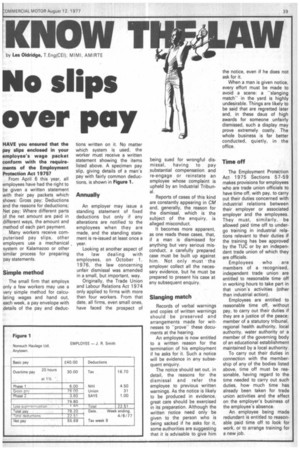by Les Oldridge, T Eng(CEI) MFMI AMIRTE
Page 41

If you've noticed an error in this article please click here to report it so we can fix it.
Nod ips over pay
HAVE you ensured that the pay slips enclosed in your employee's wage packet conform with the requirements of the Employment Protection Act 1975?
From April 6 this year, all employees have had the right to be given a written statement with their pay packets which. shows: Gross pay; Deductions and the reasons for deductions; Net pay: Where different parts of the net amount are paid in different ways, the amount and method of each part payment.
Many workers receive cornputerised pay slips, other employers use a mechanical system or Kalamazoo or other similar process for preparing pay statements.
Simple method
The small firm that employs only a few workers may use a very simple method for calculating wages and hand out, each week, a pay envelope with details of the pay and deduc tions written on it. No matter which system is used, the worker must receive a written statement showing the items listed above. A specimen pay slip, giving details of a man's pay with fairly common deductions, is shown in Figure 1.
Annually
An employer may issue a standing statement of fixed deductions but only if any alterations are notified to the employees when they are made, and the standing statement is re-issued at least once a year.
Looking at another aspect of the law dealing with employees, on October 1, 1976, the law concerning unfair dismissal was amended in a small, but important, way.
Originally, the Trade Union and Labour Relations Act 1974 only applied to firms with more than four workers. From that date, all firms, even small ones, have faced the prospect of being sued for wrongful dismissal, having to pay substantial compensation and re-engage or reinstate an employee whose complaint is upheld by an Industrial Tribunal
Reports of cases of this kind are constantly appearing in CM and, generally, the reason for the dismissal, which is the subject of the enquiry, is alleged misconduct.
It becomes more apparent, as one reads these cases, that, if a man is dismissed for anything but very serious misconduct, a carefully prepared case must be built up against him. Not only must the employer collect all the necessary evidence, but he must be prepared to present his case at any subsequent enquiry.
Slanging match
Records of verbal warnings and copies of written warnings should be preserved and arrangements made for witnesses to "prove' these documents at the hearing.
An employee is now entitled to a written reason for the termination of his employment if he asks for it. Such a notice will be evidence in any subsequent enquiry.
The notice should set out, in detail, the reasons for the dismissal and refer the employee to previous written warnings. As the notice is likely to be produced in evidence, great care should be exercised in its preparation. Although the written notice need only be given to the person who is being sacked if he asks for it, some authorities are suggesting that it is advisable to give him the notice, even if he does not ask for it.
When a man is given notice, every effort must be made to avoid a scene: a "slanging match" in the yard is highly undesirable. Things are likely to be said that are regretted later and, in these daus of high awards for someone unfairly dismissed, such a display may prove extremely costly. The whole business is far better conducted, quietly, in the office.
Time off
The Employment Protection Act 1 975 Sections 57-59 makes provisions for employees who are trade union officials to have time off, with pay, to carry out their duties concerned with industrial relations between their employer or associated employer and the employees. They must, similarly, be allowed paid time off to undergo training in industrial relations relevant to their duties if the training has bee approved by the TUC or by an independent trade union of which they are officials.
Employees who a re members of a recognised, independent trade union are entitled to reasonable time off in working hours to take part in that union's activities (other than industrial action).
Employees are entitled to reasonable time off, without pay, to carry out their duties if they are a justice of the peace; member of a statutory tribunal, regional health authority, local authority, water authority or a member of the governing body of an educational establishment maintained by a local authority.
To carry out their duties in connection with the membership of any of the bodies listed above, time off must be reasonable, having regard to the time needed to carry out such duties, how much time has already been taken for trade union activities and the effect on the employer's business of the employee's absence.
An employee being made redundant is entitled to reasonable paid time off to look for work, or to arrange training for a new job.




















































































